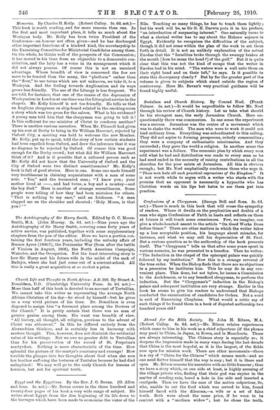Confessions of a Clergyman. (George Bell and Sons. 2s. 6d.
net.)—There is much in this book that will rouse the sympathy of readers. Where it dwells on the perplexities and doubts of a man who signs Confessions of Faith in haste and reflects on them at leisure it will touch some consciences. Few, we imagine, can give a whole-hearted assent to the article "On Good Works Done before Grace." There are other matters in which the writer takes up a less acceptable position, his language about miracles, for instance, and what we may call his depreciation of St. Paul. But a curious question as to the authorship of the book presents itself. The " Clergyman " tells us that after some years spent in various euracies, he was presented to a benefice. Then he writes: "The Induction in the chapel of the episcopal palace was quickly followed by my institution." Now this is a strange reversal of the true order. When the Bishop finds that there are no objections to a presentee he institutes him. This he may do in any con- venient place. This done, but not Wore, he issues a Commission to the Archdeacon, or to any beneficed clergyman, to perform the induction. But the "Clergyman's" induction in the Bishop's palace and subsequent institution are very strange. Earlier in the book he seems to give his readers to understand that Bishops conducted the examination of candidates for Orders. Not a word is said of Examining Chaplains. What would a critic say of such things if he found them in a book of disputed authorship two hundred years old?










































 Previous page
Previous page